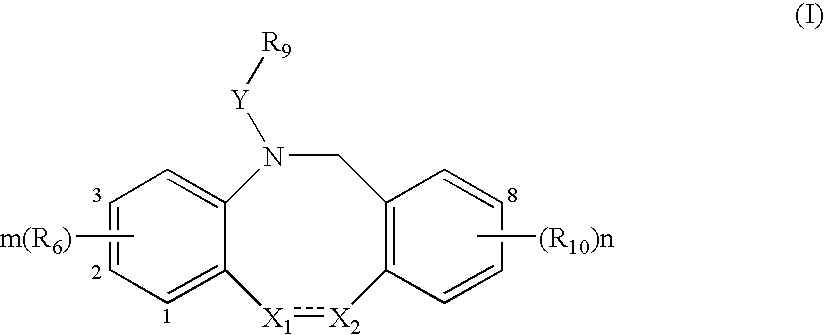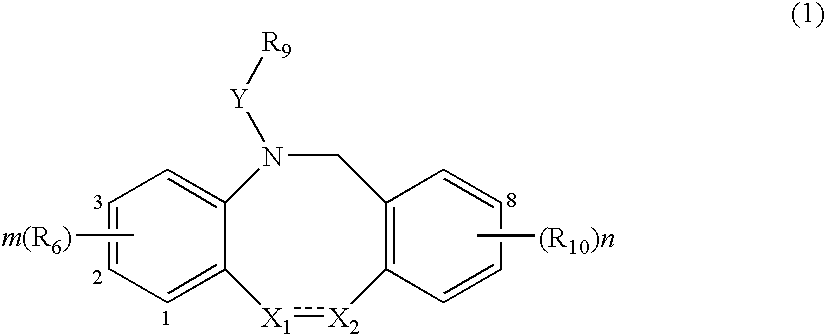Fused tricyclic compounds as inhibitors of 17β-hydroxysteroid dehydrogenase 3
a technology of hydroxysteroid dehydrogenase and tricyclic compounds, which is applied in the direction of heterocyclic compound active ingredients, biocide, drug compositions, etc., can solve the problems of affecting the response of patients receiving these treatments, affecting the effect of lhrh analogues on the central nervous system feedback mechanism, and largely restricted responses
- Summary
- Abstract
- Description
- Claims
- Application Information
AI Technical Summary
Benefits of technology
Problems solved by technology
Method used
Image
Examples
example 1
Preparation of 1-(8-Bromo-2-chloro-6H-dibenzo[b,f]azocin-5-yl)-ethanone
[0245]
[0246]To a stirred solution of N-(5-Bromo-2-iodo-benzyl)-N-(4-chloro-2-vinyl-phenyl)-acetamide (0.55 g, 1.5 mmol) and Et3N (0.63 mL, 4.5 mmol) in DMF (25 mL) was added PdCl2 (40 mg, 0.23 mmol) and the reaction was heated to 60° C. When the reaction was complete by HPLC the mixture was poured into H2O and extracted with Et2O. The Et2O layer was washed with H2O (2×20mL) and brine (20 mL), dried (MgSO4), filtered and concentrated in vacuo. The residue obtained was purified by flash chromatography eluting with CH2Cl2 to give 1-(8-Bromo-2-chloro-6H-dibenzo[b,f]azocin-5-yl)-ethanone (0.24 g, 60%).
examples 2 to 20
[0247]The compounds listed in Table 1 were prepared according to Example 1 by either Method 1 or Method 2.
[0248]
TABLE 1HPLCExampleRet TimeNo.R7R8R10R11Compound Name[M + H](min)2HHHBr5-Acetyl-9-bromo-5,6-dihydro-328.14.08dibenz[b,f]azocine3ClHHBr5-Acetyl-9-bromo-2-chloro-5,6-dihydro-363.984.38dibenz[b,f]azocine4HHHH5-Acetyl-5,6-dihydro-dibenz[b,f]azocine2502.90(c)5HClBrH5-Acetyl-8-bromo-3-chloro-5,6-dihydro-3623.44(c)dibenz[b,f]azocine6HHFBr5-Acetyl-9-bromo-8-fluoro-5,6-dihydro-3463.27(c)dibenz[b,f]azocine7ClHFBr5-Acetyl-9-bromo-2-chloro-8-fluoro-5,6-3803.55(c)dihydro-dibenz[b,f]azocine8HClFBr5-Acetyl-9-bromo-3-chloro-8-fluoro-5,6-3803.47(c)dihydro-dibenz[b,f]azocine9HHBrF5-Acetyl-8-bromo-9-fluoro-5,6-dihydro-3463.24(c)dibenz[b,f]azocine10ClHBrF5-Acetyl-8-bromo-2-chloro-9-fluoro-5,6-3803.52(c)dihydro-dibenz[b,f]azocine11HClBrF5-Acetyl-8-bromo-3-chloro-9-fluoro-5,6-3803.45dihydro-dibenz[b,f]azocine12MeOHBrH5-Acetyl-8-bromo-5,6-dihydro-2-methoxy-3593.46(c)dibenz[b,f]azocine13HNO2BrH5-A...
example 21
N-[2-(5-Acetyl-2-chloro-5,6,11,12-tetrahydro-dibenzo[b,f]azocin-8-yl)-phenyl]-acetamide
[0249]
21A. Preparation of 1-[2-Chloro-8-(4,4,5,5-tetramethyl-[1,3,2]dioxaborolan-2-yl)-6H-dibenzo[b,f]azocin-5-yl]-ethanone
[0250]
[0251]To a 10 mL round bottom flask was added Example 1 (0.1 g, 0.277 mmole) in dioxane (5 mL) under an argon atmosphere. To this solution was added (diphenylphosphino)ferrocine (15.4 mg, 0.027 mmole), bis(pinacolato)diboron (77.4 mg, 0.304 mmole), potassium acetate (81.5 mg, 0.83 mmole) and palladium dichloride(diphenylphosphino)ferrocine (20 mg, 0.027 mmole). The reaction mixture was heated to 90° C. for 6 hours. The reaction was concentrated, dissolved in 1:1 ethyl acetate / hexanes and passed through a pad of silica. The pure fractions were collected and concentrated to give 1-[2-Chloro-8-(4,4,5,5-tetramethyl-[1,3,2]dioxaborolan-2-yl)-6H-dibenzo[b,f]azocin-5-yl]-ethanone (90 mg, 80%). 1HNMR (CDCl3) δ 7.63 (s, 1H), 7.60 (d, 1H, J=7.92 Hz), 7.20 (m, 2H), 7.10 (m, 2H), 6....
PUM
| Property | Measurement | Unit |
|---|---|---|
| total volume | aaaaa | aaaaa |
| temperature | aaaaa | aaaaa |
| temperature | aaaaa | aaaaa |
Abstract
Description
Claims
Application Information
 Login to View More
Login to View More - R&D
- Intellectual Property
- Life Sciences
- Materials
- Tech Scout
- Unparalleled Data Quality
- Higher Quality Content
- 60% Fewer Hallucinations
Browse by: Latest US Patents, China's latest patents, Technical Efficacy Thesaurus, Application Domain, Technology Topic, Popular Technical Reports.
© 2025 PatSnap. All rights reserved.Legal|Privacy policy|Modern Slavery Act Transparency Statement|Sitemap|About US| Contact US: help@patsnap.com



